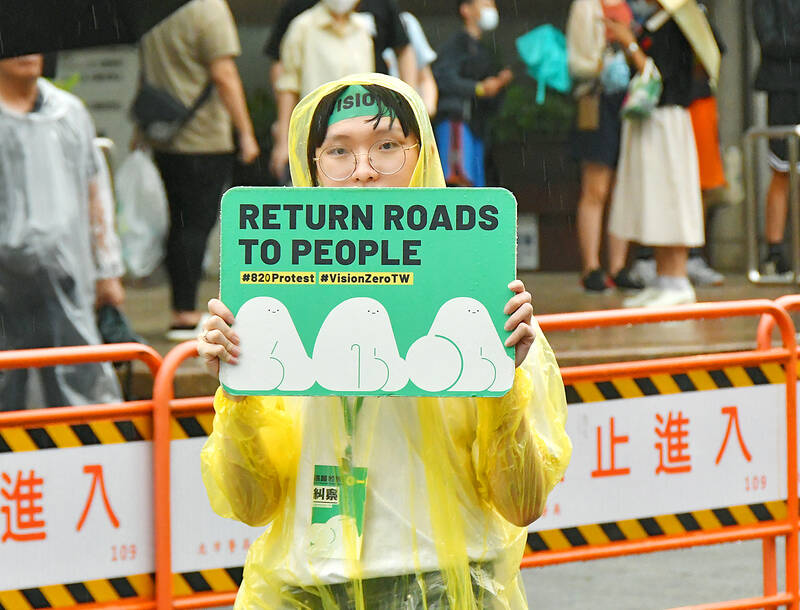When it comes to vehicles hitting pedestrians, the blanket term “accident” doesn’t cut it for the activists behind Vision Zero Taiwan.
“We have … mistaken accident for acts of nature, forgetting their human-made origin,” reads the text for an event on Saturday organized by the group to commemorate victims of “traffic violence.”
As part of the Day of Remembrance for Road Traffic Victims in Taiwan, demonstrators will gather at 6pm in busy districts in Taipei, Hsinchu, Taichung and Kaohsiung. Participants will walk along an assigned route to commemorate the 3,023 people who lost their lives on Taiwan’s roads last year.

Photo courtesy of Vision Zero Taiwan
“Taiwanese have become accustomed to viewing traffic deaths and injuries as … something to be resigned to as bad luck,” the text for the event explains.
However, most accidents are “preventable and avoidable.”
Established in 1995 in Sweden, Vision Zero, has become a multinational traffic safety initiative. A guiding principle of the project is that the life and health of citizens should not be traded for other social benefits. Many Vision Zero measures have been adopted by governments in countries and cities around the world.

Photo courtesy of Vision Zero Taiwan
WIDESPREAD ATTENTION
As one of the main organizers of Vision Zero Taiwan, YC Wu (吳宜蒨) played a key role in getting Taiwan’s Executive Yuan to approve a set of guidelines on pedestrian safety drafted by the Ministry of the Interior last year.
Following two incidents in which she was hit by cars while crossing roads in Taipei, Wu was diagnosed with PTSD and left fearful of walking in the city.
“I realized that I was not the only one who suffered physically and mentally because of traffic, but no one wanted to stand up and speak out,” she tells the Taipei Times.
Gathering a group of likeminded partners together, Wu organized “the first march on pedestrian rights in Taiwan’s history,” in August last year. The protest, which was held under the provocative banner “stop killing pedestrians” took place on Taipei’s Ketagalan Boulevard. It drew considerable media coverage and even the attention of the political top brass.
“I didn’t expect that all presidential candidates would show up,” says Wu. The groundswell of support piled pressure on the government to approve a higher-level set of policy guidelines for pedestrian traffic safety to be implemented from last year to 2027. The guidelines include three main initiatives: the enactment of a basic act for road traffic safety; measures to encourage greater use of public transportation; and the implementation of improvements to pedestrian safety.
“Getting the government [to agree] to pass a basic act of traffic safety in Taiwan, was beyond my wildest expectations,” says Wu.
CONTRADICTORY POLICIES
As the first step of this plan, a draft bill on sidewalk safety measures was submitted to the Legislative Yuan on March 7. However, there are concerns that this positive action could be a case of one step forward and two steps back: On the same day, the Cabinet announced approval of a separate bill from the Ministry of Transportation and Communications to reduce fines for “minor” infractions, including riding scooters on sidewalks.
Considering the reference in the Ministry of the Interior initiatives to “heavier traffic fines … for key traffic violations,” the two policies appear contradictory.
“The [MOI] seems to have more political will to improve the situation,” says Yi-xian (一閑), an activist with Vision Zero Taiwan who prefers to use only her given name.
She notes that, worldwide, many cities that have implemented Vision Zero principles on “physical road interventions” such as lane narrowing and 30-kph speed limits, have seen a significant reduction in traffic casualties.
“Our concern is that, since it is only a concept and lacks any binding force, if governments do not have the political will or courage to adopt measures already established in other regions, it will remain merely an empty slogan,” she says.
Such fears have motivated activists to take concrete action. Last weekend saw Vision Zero Taiwan and other advocacy groups for pedestrian and disabled rights organize flash mob protests islandwide. Saturday’s remembrance events are aimed at emphasizing the human element in the equation.
“We have long forgotten that casualty statistics represent lives lost, not just numbers,” reads the statement for the event.
OVERTON WINDOW
Participants in Saturday’s memorial walks will be given electronic candles to carry. A moment’s silence will be held to honor those who have lost their lives on Taiwan’s roads. Following this vigil, people will be invited to fold white paper cranes and “share stories of the trauma and pain caused by the violence embedded in our transportation system.”
Jonathan Knowles, a long-term British resident of Taiwan, who helped organize Saturday’s event and last year’s protest, refers to the “Overton window of discourse regarding the inevitability of traffic deaths and injuries in Taiwan.”
The Overton window refers to the range of policies that are considered acceptable by the public at any given time.
“While many campaigns focus on reducing casualties, we wanted ours to plant the idea in people’s minds that there is a possible future in which all road deaths are a thing of the past,” he says.

Taiwan has next to no political engagement in Myanmar, either with the ruling military junta nor the dozens of armed groups who’ve in the last five years taken over around two-thirds of the nation’s territory in a sprawling, patchwork civil war. But early last month, the leader of one relatively minor Burmese revolutionary faction, General Nerdah Bomya, who is also an alleged war criminal, made a low key visit to Taipei, where he met with a member of President William Lai’s (賴清德) staff, a retired Taiwanese military official and several academics. “I feel like Taiwan is a good example of

March 2 to March 8 Gunfire rang out along the shore of the frontline island of Lieyu (烈嶼) on a foggy afternoon on March 7, 1987. By the time it was over, about 20 unarmed Vietnamese refugees — men, women, elderly and children — were dead. They were hastily buried, followed by decades of silence. Months later, opposition politicians and journalists tried to uncover what had happened, but conflicting accounts only deepened the confusion. One version suggested that government troops had mistakenly killed their own operatives attempting to return home from Vietnam. The military maintained that the

Jacques Poissant’s suffering stopped the day he asked his daughter if it would be “cowardly to ask to be helped to die.” The retired Canadian insurance adviser was 93, and “was wasting away” after a long battle with prostate cancer. “He no longer had any zest for life,” Josee Poissant said. Last year her mother made the same choice at 96 when she realized she would not be getting out of hospital. She died surrounded by her children and their partners listening to the music she loved. “She was at peace. She sang until she went to sleep.” Josee Poissant remembers it as a beautiful

Before the last section of the round-the-island railway was electrified, one old blue train still chugged back and forth between Pingtung County’s Fangliao (枋寮) and Taitung (台東) stations once a day. It was so slow, was so hot (it had no air conditioning) and covered such a short distance, that the low fare still failed to attract many riders. This relic of the past was finally retired when the South Link Line was fully electrified on Dec. 23, 2020. A wave of nostalgia surrounded the termination of the Ordinary Train service, as these train carriages had been in use for decades